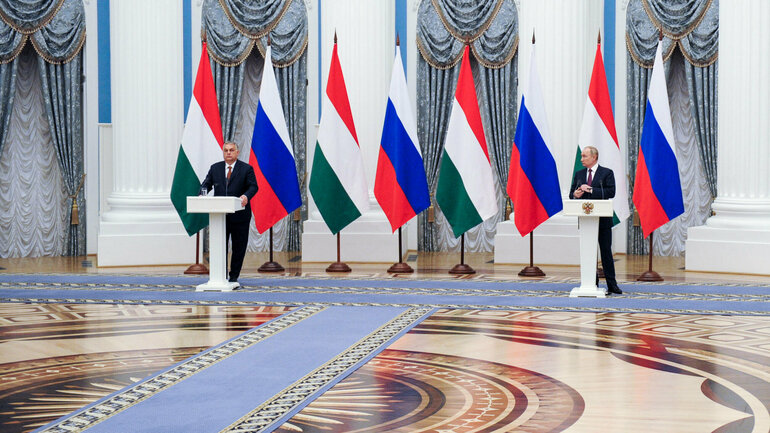Hungary’s Pragmatism: Courting Russia, Pleasing the EU

Although Hungary has so far supported the EU sanctions imposed on Russia because of the war in Ukraine, it has frequently done so reluctantly, occasionally even threatening to use its veto in the EU Council. At the same time, domestically, the Hungarian government has started a campaign in which it compares EU sanctions to bombs. The government has called on all Hungarian citizens to express their dislike for the EU’s sanctions policy in a national consultation, which is based on an opinionated, manipulative questionnaire.
The fact that Hungary is taking a maverick position, manoeuvring between the EU and Russia and making gestures in favour of the latter, should hardly surprise anyone at this point. However, it is perplexing that Hungarian citizens, whose suspicion towards Russia is deeply ingrained and who still cling to memories of the 1956 Hungarian Revolution, are siding with Russia and not Ukraine.
Balancing between the EU and Russia
In the context of the war in Ukraine, Hungarian prime minister Viktor Orbán has clearly declared his priorities, which are to secure the flow of gas from Russia and to protect the Hungarian minority living in Ukraine. A swift end to the war could realise both aims. The fact that this position is morally questionable is of little concern to Orbán, because, he believes, norms and values should not be the measure of foreign policy decisions. Orbán has emphasised that proper foreign policy should be rooted in the national interest and that ideologically driven foreign policy was ‘invented by clever states for use by dumb ones’.
The Hungarian regime’s declared objective to represent all Hungarians, including Hungarian minorities living in neighbouring counties, was bound to lead to conflictual relations with Ukraine since Orbán’s Fidesz party regained power in 2010. Conflicts were usually framed as concerns for the fate of the Hungarian minority in Transcarpathia, including debates over dual citizenship or the curtailing of the use of the Hungarian language. Still, many believe that Hungary’s hostile steps towards Ukraine since 2014 – like blocking meetings between NATO and Ukraine – were not so much motivated by a concern for the Hungarian minority as geared towards courting Russia.
Doing favours for Russia fits Orbán’s declared modus vivendi for Hungary, which is based on the objective of balancing between the EU and Russia. He believes closer ties with Russia offer leverage for Hungary in its negotiations with the EU and the US. Meanwhile, Russia has been a source of inspiration for creating an illiberal state. Therefore, what begs explanation is not government policy but the contradiction between Orbán’s present-day pro-Russian attitude and his freedom-fighter image, with which he portrays himself as the man who almost single-handedly drove Soviet troops out of the country in 1989. How can Fidesz voters reconcile this inconsistency?
Part of the explanation lies in the intense propaganda machinery – including in the national media – that the regime uses to almost copy-paste Russian propaganda and shape public opinion. Surveys show that whereas in early March 2022 only 11 per cent of Fidesz supporters saw Russia’s attack on Ukraine as justified, by the end of the month the number had increased to 43 per cent.
Easier to explain is why Eurosceptic voices resonate. Some resentment towards the West for having abandoned the East to the mercy of the communists remains present throughout Central and Eastern Europe. Still, it requires a flexible interpretation of facts to frame Hungary’s history since the end of World War I along a narrative that – in the prime minister’s words – the West ‘raped’ Eastern Europe and betrayed Hungary again in 1956.
Words and institutions with no meaning
But propaganda only partly explains why Hungarian public opinion is so amenable to such flexible treatment of the past by the regime. The other part of the explanation is that words have lost their meaning and institutions operate contrary to their ethos. Orbán’s claim that ‘I am the most Christian, and thus the most European, of Europeans. Europe’s DNA is me. I am its guardian’ embodies the messianic and befuddled phrases that resonate among many but shock those who insist on reason and consistency.
At one level, words are mere posturing, as Orbán has admitted: ‘What I emphasise continuously to foreign diplomats is to pay attention not to my words but to my actions.’ But it is not only words that have lost their meaning. The media and public television in Hungary serve not to keep power at bay and under democratic control but to broadcast propaganda. Courts and the law are used in an arbitrary manner, turned against some while ignoring blatant offences and injustices committed by those favoured by the regime.
The opposition, even if its dedicated members try to make a difference, unavoidably becomes complicit in maintaining the illusion of democracy. As the regime has a two-thirds majority in parliament and freely introduces one state of emergency after the other, the parliament is but a facade that Hungary is still a working democracy. In this post-truth reality, challenging the government with reason is futile, and populists are better equipped in the fight over emotions.
No remedies in sight
Why is all of this important? Because in a situation where words have no meaning and institutions are hollowed out and used against their dedicated goals, any concessions the Hungarian regime makes to please the EU – and acquire EU funds – are unlikely to offer any remedies to repair Hungarian democracy.
As the country faces severe economic hardship with mounting inflation, what resonates is the government’s call for peace, which absurdly suggests that the EU and the West are responsible for the continuation of the war. Voices that point out the fakery of such a narrative easily get lost.
Prof. Ákos Kopper is a Humboldt research fellow and a visiting researcher at ZOiS.